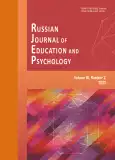Methodology of using digital educational resources in the educational process
- Autores: Bulatova S.V.1, Fayzullina A.G.1, Aglyamova Z.S.2, Frolova I.I.3
-
Afiliações:
- Naberezhnye Chelny Institute of Kazan (Volga Region) Federal University
- Kazan Innovative University named after V. G. Timiryasov
- Kazan Innovative University named after V.G. Timiryasov
- Edição: Volume 16, Nº 2 (2025)
- Páginas: 52-72
- Seção: Educational and Pedagogical Studies
- ##submission.datePublished##: 30.04.2025
- URL: https://journal-vniispk.ru/2658-4034/article/view/302686
- DOI: https://doi.org/10.12731/2658-4034-2025-16-2-724
- EDN: https://elibrary.ru/UCRDFA
- ID: 302686
Citar
Texto integral
Resumo
Background. In the conditions of intense development of technologies and digitalization of education, the use of digital educational resources is becoming a prerequisite for improving the quality of education. This article describes the benefits and challenges associated with the introduction of digital educational technologies, as well as their impact on the educational process and educational outcomes. The article defines the role of digital resources in ensuring accessibility of modern education and individualization of learning. The main didactic principles of J.A. Komensky and implementation are considered using the example of the developed digital educational resource in the discipline "Computer Science and Information Technology".
Purpose. Development and justification of the methodology for using expanded educational resources in the educational process, aimed at increasing the effectiveness of training, individualization of students’ learning trajectories and integration of modern technologies into the educational environment.
Materials and methods. The work describes a range of approaches to developing digital educational materials, including the use of multimedia technologies, interactive platforms and educational applications. We analyzed modern methods and tools that promote effective learning and student engagement in the educational process.
Results. Analysis of the impact of digital technologies on the educational process, assessment of the effectiveness of using such resources in education, impact on motivation and student engagement. The article includes examples of successful practices and recommendations for the implementation of digital educational resources in the educational process.
Sobre autores
Svetlana Bulatova
Naberezhnye Chelny Institute of Kazan (Volga Region) Federal University
Autor responsável pela correspondência
Email: svetlanavladimirovna7061982@mail.ru
ORCID ID: 0009-0001-7534-0451
Código SPIN: 6012-7000
Senior Lecturer, Department of Information Systems
Rússia, 68/19, Mira Ave., Naberezhnye Chelny, 423812, Russian FederationAigul Fayzullina
Naberezhnye Chelny Institute of Kazan (Volga Region) Federal University
Email: dlya_pisem_t@mail.ru
ORCID ID: 0000-0003-4369-3057
Código SPIN: 1510-4203
Scopus Author ID: 56674809200
Researcher ID: L-7734-2015
Senior Lecturer, Department of Business Informatics and Mathematical Methods in Economics
Rússia, 68/19, Mira Ave., Naberezhnye Chelny, 423812, Russian FederationZulfina Aglyamova
Kazan Innovative University named after V. G. Timiryasov
Email: aglamova@chl.ieml.ru
ORCID ID: 0000-0002-7604-489X
Código SPIN: 8105-6507
Scopus Author ID: 56682863800
Researcher ID: M-1629-2016
PhD in Pedagogy, Associate Professor of the Department of Higher Mathematics, Modeling and Data Analysis
Rússia, 42, Moskovskaya Str., Kazan, 420111, Russian FederationIrina Frolova
Kazan Innovative University named after V.G. Timiryasov
Email: fii@mail.ru
ORCID ID: 0000-0002-8707-6336
Código SPIN: 8758-7488
Scopus Author ID: 56286018900
Researcher ID: M-8661-2015
PhD in Sociology, Associate Professor, Associate Professor of Digital Economy and Quality Management
Rússia, 42, Moskovskaya Str., Kazan, 420111, Russian FederationBibliografia
- Baklanova, G. A. (2013). Formation of readiness of future primary school teachers to use digital educational resources (Abstract of PhD Dissertation in Pedagogy). Barnaul. 23 p. EDN: https://elibrary.ru/QIGXHT
- Bulatova, S. V. (2024). Pedagogical aspects of using digital educational resources in the educational process. In Proceedings of the International Scientific and Practical Conference "Use of Information Technologies in Various Spheres of Activity" (pp. 163–165). Gomel: Belarusian Trade and Economic University of Consumer Cooperatives. EDN: https://elibrary.ru/DDFLMN
- Gavrikov, A. L. (2000). Opportunities for using electronic textbooks in the educational process. Novgorod. Retrieved from http://www.artinfo.ru/eva/EVA2000M/eva-papers/200003/Gavrikov-R.htm (accessed: February 10, 2025).
- Grozyan, N. F., & Prudnikova, T. I. (2021). Didactic principles of J. A. Comenius: Principles of implementation in modern school. Problems of Modern Pedagogical Education, (70-2), 63–66. EDN: https://elibrary.ru/YMWQFC
- Davidovsky, G. A. (2024). Organization of independent work of students in computer science based on digital educational resources. Retrieved from https://infourok.ru/statya-po-teme-organizaciya-samostoyatelnoy-raboti-obuchayuschihsya-po-informatike-na-osnove-cifrovih-obrazovatelnih-resursov-3779131 (accessed: January 20, 2025).
- Eliseeva, E. V. (2010). Digital educational resources as a component of the innovative educational environment of a modern university. Bulletin of Bryansk State University, (1), 56–60. EDN: https://elibrary.ru/MNHLPV
- Using Internet resources in the educational process. Retrieved from http://www.teacherjournal.ru/shkola/informatika/2322-ispolzovanie-resursov-internet-v-uchebno-vospitatelnom-proczesse.html (accessed: November 29, 2024).
- Using digital educational resources in the educational process. Retrieved from https://wiki.i-edu.ru/mediawiki/index.php/Использование_ЦОР_в_образовательном_процессе (accessed: February 2, 2025).
- Koroteeva, A. S., & Chelpachenko, T. V. (2022). Digital educational resources as a means of improving the effectiveness of information assimilation by students. Historical and Pedagogical Journal, (3), 126–133. EDN: https://elibrary.ru/RYTJOG
- Poladov, Shokhrat. (2024). Digital educational resources and their types by presentation and content. Young Scientist, (7), 237–239. Retrieved from https://moluch.ru/archive/506/111371 (accessed: February 2, 2025). EDN: https://elibrary.ru/BMGNQQ
- Course program of the discipline "Informatics and Information Technologies" for students of the direction of training 09.03.03 "Applied Informatics". Retrieved from https://kpfu.ru/pdf/portal/oop/316389 (accessed: January 10, 2025).
- Tarasov, S. P. (2022). Classifications and typologies of digital educational resources. Karaganda. Retrieved from https://multiurok.ru/blog/klassifikatsii-i-tipologii-tsor.html (accessed: January 10, 2025).
- Digital educational resources as an electronic component of the learning process. Retrieved from https://worldofteacher.com/8688-konsultaciya-dlya-pedagogov-doo-cifrovye-obrazovatelnye-resursy-kak-elektronnyy-komponent-processa-obucheniya (accessed: January 15, 2025).
- Digital educational resources and their use in the educational process. Retrieved from https://www.xn-2-stbo5a.xn-p1ai/images/sampledata/doc/ansm1 (accessed: December 12, 2024).
- Digital educational resources and their possibilities for organizing online learning. Retrieved from https://ipk.68edu.ru/index.php/component/k2/item/1549-tsifrovye-obrazovatelnye-resursy-i-ikh-vozmozhnosti-dlya-organizatsii-onlajn-obucheniya (accessed: December 12, 2024).
Arquivos suplementares










